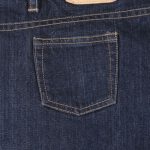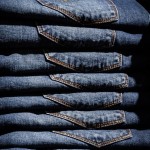There are different treatment processes available for jeans. When producing jeans, manufacturers may expose them to pumice stones. A treatment process known as stone washing, it promotes softer jeans by intentionally breaking down the denim fibers. Resin treatment is another process available for jeans. What is resin treatment exactly, and how does it affect jeans?
The Basics of Resin Treatment
Resin treatment involves the application of a synthetic resin to the surface of jeans. It’s designed to create a stiff and shiny denim finish. The resin is typically applied to the denim fabric after the jeans have been cut and sewn into their final shape. Once applied, the jeans are placed in a large commercial oven where they are baked. Exposure to the hot air inside of the oven will allow the resin to cure.
How Resin Treatment Affects Jeans
When treated with resin, jeans undergo several changes. As previously mentioned, it will make the jeans stiffer. Resin-treated jeans are almost always stiffer than their untreated counterparts. They are still made of denim. Denim is comprised of cotton, which is known for its soft and fluffy properties. But resin treatment will result in a layer of hardened resin over the surface of the jeans. The end result is stiffer jeans. Some people prefer harder, stiffer jeans, so they specifically look for resin-treated jeans.
Resin-treated jeans also have a shinier, glossier finish than traditional jeans. After curing, the resin will form a transparent layer over the surface of the jeans. This transparent layer will have a naturally shiny appearance to it.
Another way that resin treatment affects jeans involves wrinkles. Contrary to common belief, resin treatment doesn’t prevent wrinkles. It actually has the opposite effect by creating wrinkles. Jeans can develop wrinkles — just like all other garments. Resin treatment, however, allows wrinkles to harden in place.
Exploring the Process of Resin Treatment
You might be wondering what resin treatment involves. Like with other treatment processes, not all manufacturers use the exact same resin treatment process; some manufacturers use their own resin treatment process that differs from other manufacturers’ resin treatment process. With that said, this treatment process typically begins with spraying or dipping the jeans in a synthetic resin.
The resin used in this treatment process contains a chemical that allows for a shiny, glossy surface. After applying the resin, manufacturers will cure the jeans. Curing requires heat, which is why the jeans are placed in an oven. Baking the jeans in an oven will expose them to hot air so that the resin is able to cure. Depending on the type of resin used, curing may take anywhere from a few minutes to several hours.
Some of the most common types of resin used in this denim finishing process include the following:
- Glyoxal resin
- Acryl resin
- Urea formaldehyde resin
- Ketone resin
- Phenol resin
After curing, the jeans may undergo other treatment processes, such as sandblasting or stone washing. The jeans are then packaged and sold to vendors or customers.

Pros and Cons of Resin Treatment
If you’re thinking about buying a pair of resin-treated jeans, you should weigh all of their pros and cons. One of the main advantages of choosing resin-treated jeans is their glossy and shiny appearance. You won’t find jeans with this same glossy and shiny appearance elsewhere. Rather, only those that have been subjected to resin treatment will feature this appearance.
Resin-treated jeans are better protected from stains than traditional jeans. They feature a layer of cured, hardened resin over the surface. While transparent, this layer will shield the underlying denim from stain-causing compounds. If you’re worried about stains, you may want to choose resin-treated jeans for this reason.
On the other hand, resin-treated jeans often contain wrinkles that are difficult or impossible to remove. Manufacturers may intentionally add wrinkles to resin-treated jeans. It’s designed to create a more aged, vintage style. Old jeans often have wrinkles. To achieve a similar style, manufacturers may add wrinkles to their jeans via resin treatment. They will twist and turn the jeans to achieve the desired wrinkles, after which they will apply the resin to harden the wrinkles in place.
Maintaining Resin-Treated Jeans: What You Should Know
Resin-treated jeans require special care to maintain their appearance and prolong their lifespan. Always follow the manufacturer’s care instructions carefully to ensure that you don’t damage the transparent layer of resin. Some resin-treated jeans may need to be washed by hand or dry cleaned, while others can be machine washed on a gentle cycle. You can refer to the manufacturer’s care instructions on the care label or tag for more information on how to wash them.
When washing your resin-treated jeans, use a mild liquid-based detergent that is gentle on the fabric and won’t strip away the resin finish. Avoid using bleach or fabric softeners, as these products can damage the fabric and reduce the effectiveness of the resin treatment.
Another tip to prolong the life of your resin-treated jeans is to wash them in cold water. Resin-treated jeans should always be washed in cold water. Hot water can cause the resin to crack or peel, resulting in permanent damage. If possible, turn your jeans inside out before washing them to further protect the resin finish.
Resin-treated jeans should be air dried rather than machine dried. The heat from a clothes dryer can damage the resin finish. As the already-cured resin begins to heat up, it may melt To prevent this from happening, hang your resin-treated jeans up to dry, or lay them flat on a clean towel to avoid stretching or distorting the fabric.
Don’t forget to store your resin-treated jeans correctly as well. When storing your resin-treated jeans, avoid folding or creasing them in a way that could damage the resin finish. A better option is to hang them up or store them flat in a drawer or closet. Just remember to store your resin-treated jeans in an area where they aren’t directly exposed to sunlight or heat.











